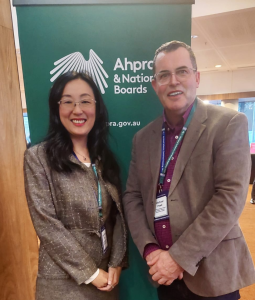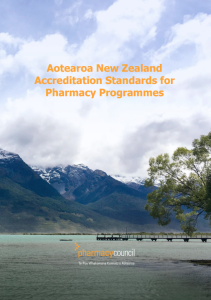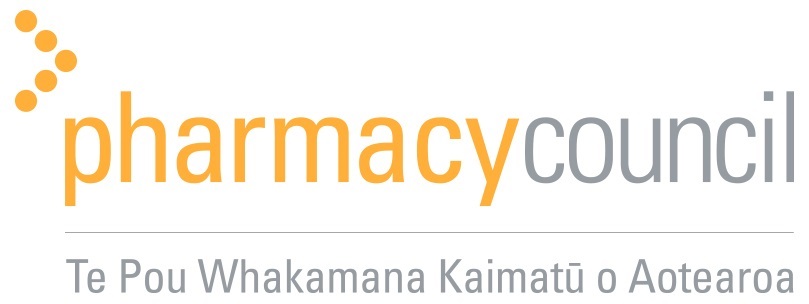
FROM THE COUNCIL CHAIR AND CE
MESSAGE FROM THE CHAIR AND CE
Kia ora koutou
In this newsletter, you’ll read about the progress we are making on the Innovation Statement, which will further support pharmacists to work within the full boundaries of their scope. We are also progressing work looking at whether alternative pathways may support more overseas pharmacists to apply and stay working in New Zealand, which will help to build the workforce sustainably. These topics, along with an update on prescribing pharmacists, formed the basis of our recent discussion with Hon. Simeon Brown, the Minister of Health.
It was an extremely valuable discussion, with the Minister in acknowledging many of the constraints currently facing the sector. We also used the opportunity to reiterate our support for the review of the Health Practitioners Competence Assurance Act, clarifying how occupational regulation can be part of the solution to ensure patient focused care while still building the workforce, increasing retention, and making sure the pharmacy model is working effectively.
Late last month, we travelled to Australia to meet with the Pharmacy Board of Australia and attended a regulators conference organised by Ahpra (Australia Health Practitioner Regulatory Agency). The conference was to discuss the National Registration and Accreditation Scheme, which is the Australian occupational regulatory scheme, and also looked at regulatory changes across other jurisdictions.

Ming-chun Wu and Michael Pead at the recent Aphra Conference in Melbourne
It was very interesting hearing the challenges and opportunities of workforce regulation in other regions, particularly Singapore and Australia, and how we face many of the same issues. The Australian system is currently under review, and you may be interested in reading more about it here.
We are still waiting on the results of the Council Member appointment process, and looking forward to welcoming the new members into Council when the announcement is made.
You’ll see that we are currently running a communications survey, and it would be great if you could click on the link to complete the short survey. It’s important that we hear from you about the type of information you’d like to receive from us, and how often you’d like to receive it. The survey is anonymous and is only ten questions so should not take you long to complete.
Finally, we hope you have time over this Matariki season to embrace the themes of remembrance, celebration, and renewal.
Ngā mihi
Ming-chun Wu (Chair) and Michael Pead (CE)
IMPORTANT FOR YOU TO KNOW
MYRECERT REVIEW
In the coming months, we will be undertaking the annual review of a sample of randomly chosen MyRecert portfolios from the last recertification year (between 1 April 2024 to 31 March 2025).
This is an important step to provide Council with assurance that pharmacists are meeting their recertification requirements. The review is not a test or assessment, and the randomly selected pharmacists will be given feedback on their portfolios that can be used to reflect and improve. It is not about completing the requirements per se but an opportunity for Council to see that pharmacists are incorporating professional development into your practice as a means of keeping yourself fit and competent to serve your patients well.
The reviews will be carried out by practising pharmacists who were selected through our expression of interest process last year, and the results will be available by early September.
Previous reviews have shown that most pharmacists use effective professional development to maintain their competence and are meeting the recertification requirements. Most portfolios reviewed previously have reached the expected standard, which is great, and we expect similar results this year. Pharmacists whose 2023/24 portfolios did not meet the expected standard will have their portfolios reviewed again.
You can view the results of the 2024 review here.
ACCREDITATION

The Pharmacy Council Accreditation Standards
The Pharmacy Council is responsible for accrediting and monitoring pharmacy education providers and their programmes to deliver safe and competent health practitioners on registration and entry into one of three scopes of practice (intern pharmacist, pharmacist, pharmacist prescriber).
This contributes to our mandate to protect the health and safety of the public by setting and ensuring high standards for pharmacy education. To meet this requirement, we have created Accreditation Standards, which are the threshold educational standards expected from all pharmacy programmes accredited in New Zealand.
The decision to accredit any programme has always been Pharmacy Council’s but in the past the review process that forms the basis of the decision(s) was provided by the Australian Pharmacy Council, which is an accrediting agency. In 2023 we brought the running of the review process in-house. Part of the accreditation process requires Council to convene a panel of experts, called the Programme Accreditation Team (PAT), to conduct any reviews.
The Auckland University commended in reaccreditation
Auckland University’s last full accreditation expired on 30 June 2023, with an interim extension of its existing accreditation approved by the Pharmacy Council to 30 June 2025. The accreditation process began with the PAT reviewing the self-assessment portfolio of evidence documents provided by the University before a three-day face to face accreditation visit in March.
The final PAT report noted that all programmes effectively support public safety and align with the Competence Standards for the Pharmacy Profession and the Code of Ethics, and made five commendations to the University regarding specific areas of strength.
This is an excellent result, with a significant amount of work behind it – both from the University and the PAT. The Pharmacy Council used these findings to reaccredit all three programmes, with no conditions, for the maximum period of five years.
HOW TO NAIL YOUR CONTINUING PROFESSIONAL DEVELOPMENT PORTFOLIO
MyRecert requires you to complete your continuing professional development (CPD) portfolio every practising year you hold an active Annual Practising Certificate.
We operate the CPD process as a high trust system, meaning that Council does not dictate what you must learn, how you learn it, or how long you take to learn it. Instead, we recognise that you are the best judge of what CPD is relevant to your own learning and development.
You should have the process well underway by now, but if you haven’t quite got round to it yet, we had a chat with Lun Shen Wong, an experienced pharmacist from Auckland, to give you some pointers from a peer on how to make the most of your CPD.

Auckland pharmacist Lun Shen Wong
Why do you see the CPD process as important?
In a profession that is constantly evolving—with new medicines, technologies, and models of care and services—the CPD process is essential in allowing us to stay current and maintain relevance in the services we provide to our communities. Beyond simply keeping up to date, CPD offers an opportunity for reflective practice. It allows us to take a step back and assess how far we’ve come, identify areas for growth, and actively shape our development in a transparent and structured manner.
It’s not just about increasing technical knowledge—it’s about continuously building the judgment, adaptability, and confidence needed to support safe, effective, and patient-centred care. CPD underpins our ability to remain not only competent, but impactful in the changing healthcare landscape which helps to provide quality assurance and trust in the profession.
How do you make sure you keep on top of recording your CPD and avoid leaving it all to the last minute?
I’m a firm believer in the 5P’s. Proper Preparation Prevents Poor Performance. I’ve found that consistency is key. Reflective practice takes time, and rushing it rarely leads to meaningful insight. I find that starting early and setting aside one hour each month means that generally I can capture and reflect on experiences while they are still fresh.
Whilst there is a deadline to have your CPD completed by, for me, it’s not just about meeting a deadline—it’s about giving the process the attention it deserves. Spacing it out over the year helps ensure that my CPD is genuine, considered and usually completed well before APC renewal time.
What are the benefits of the system?
One of the key strengths of the CPD system is that it puts the responsibility for growth in the hands of the individual. It allows you to tailor your development to what’s most relevant to your current role, future goals, and the needs of the people and communities you serve. CPD supports you in staying current with clinical knowledge, adapting to new technologies, and preparing for greater responsibility.
It also enhances confidence, decision-making, and the ability to approach complex or unfamiliar situations with out of the box solutions and care. I think that CPD also plays a role in shaping how we lead teams, mentor others, and contribute to the broader profession. It’s not just about individual development—it’s about remaining a trusted and capable professional in a changing healthcare landscape.
Do you have any suggestions for other pharmacists (especially newer pharmacists) about their CPD?
For newer pharmacists, my advice is to view CPD as a natural part of your professional journey, all health practitioners are lifelong learners; the real work starts once you register. CPD should not just be viewed as a task to complete, but an opportunity to grow. Start early and record what you learn, even if it feels small at the time.
I have often found that the most meaningful development comes from everyday experiences—interactions with patients and prescribers, challenges navigated, or skills refined on the job. Try to focus on what genuinely interests you or where you want to build confidence not just what gives you the ability to provide an accredited service.
For more experienced pharmacists, CPD gives you the chance to re-examine what you have long assumed to be true. Evidence evolves, patient expectations shift and the skill sets required to deliver these services grow. You are probably already completing these learnings on the job- you just need to give yourself credit by capturing that learning.
Anything else you’d like to add?
Choose your peer group wisely. Peer group meetings are not meant to be a routine catch up about the logistics of your job. The real value lies in shared professional reflection — a space to challenge ideas, explore new evidence, and stay accountable to your growth as a clinician. A good peer group can elevate your thinking, expose you to diverse experiences, and keep you focused on staying contemporary. Surrounding yourself with thoughtful, curious, and honest peers can be one of the most powerful drivers of development. These are colleagues who ask good questions, who push you to think more deeply, and who aren’t afraid to challenge outdated norms. In many ways, they become a sounding board and a professional mirror.
CPD isn’t about ticking boxes—it’s about staying engaged, curious, and committed to providing the best care we can. As pharmacists, we work in a space where trust and responsibility are paramount, and ongoing learning to stay up to date helps us honour that trust. Whether you’re just starting out or have years of experience, there’s always something new and exciting to learn.
Hopefully that excellent advice from Lun Shen has given you a reminder to make the most out of your CPD. You can find out more about CDP, and the specific CPD requirements, on the Recertification page on the Pharmacy Council website.
REMINDER TO CHECK THE PUBLIC REGISTER BEFORE HIRING
If you’re about to hire a new pharmacist or pharmacist prescriber, remember that checking the public register on our website is the best and most appropriate way to get up-to-date information regarding a practitioner’s registration status.
It’s not recommended to simply check a printed or electronic copy of a practitioner’s annual practising certificate, because the printed copy may not reflect any restrictions that have been put on their scope of practice after it was issued.
You can easily search the register by name or registration number here: Search Register – Pharmacy Council NZ
OUR ENGAGEMENT JOURNEY
COMMUNICATIONS SURVEY
Two years ago, we sent out a survey to find out how we could improve our communications. We used that information to develop better processes and content, and now we’re doing a follow up survey to see how we can keep improving.
We want to make sure that the information you receive from us is useful and helps you to fully understand our role as regulator. 
The survey is anonymous, and will ask what communication channels you use, what information you’d like to get, and how often you’d like to hear from us.
Click here to complete the survey!
If you have any questions or comments about the survey, or if you’re not currently receiving our newsletter and would like to be added to the mailing list, feel free to contact us by emailing [email protected]
UPDATE ON THE INNOVATION STATEMENT
In the last newsletter, we asked for people interested in joining our innovation working group. Thanks to everyone who applied, and we are pleased to say that a working group is convening for the first time this month to help us work on the innovation statement.
What’s an Innovation Statement?
The pharmacy profession has delivered many new services safely in the last decade, including vaccination, community managed anticoagulation service, minor ailment service, and clinical pharmacist in general practice. All these initiatives have resulted in better health outcomes and access for New Zealanders.
The pharmacist scope of practice is broad, and we want to encourage pharmacists to understand the permission given by our regulation and to expand practice safely with confidence, seeking further expert input when needed. Hopefully, this will result in more good innovation/ innovative ideas being scoped out appropriately, put into practice, and shared when successful.
We are developing a statement on innovative practice to help pharmacists feel confident when scoping and developing innovative services, with due considerations to areas such as service development, clinical governance, and quality improvement.
Innovation group
As a next step, we are wanted to share an early version of this innovation statement with a group of pharmacists with experience in designing and implementing innovative services, professional development support, and peer support/ coaching.
This expert group will help us to test, refine, and improve the statement before we share it with the wider profession. We are also encouraging professional organisations to develop guidelines and support for pharmacists wanting to innovate in their practise.
We’ll keep you updated as we progress this exciting area of work.
TE TIRITI ADVISORY GROUP
There was another Te Tiriti Advisory Group (TTAG) meeting this month. The purpose of the TTAG is to advise, critique, assure and support Council give effect to its Te Tiriti o Waitangi obligations, bringing their collective wisdom to all our areas of work.
The meeting focused on getting an update on the work we have been doing, with TTAG members offering advice and support on ways to strengthen and improve this mahi from a health equity perspective. Particular area of focus recently for TTAG has been our development work, the recruitment process for the Competence and Fitness to Practise Committee, and the naming process.
TTAG Functions
- Advise: To consider and make recommendations to the Pharmacy Council’s Management Team and Council in relation to the purpose of this group.
- Critique: To provide objective and critical friend analysis of the Council’s work programme and the associated initiatives.
- Assure: To provide a level of assurance to Council through oversight of its work programme and the associated initiatives in terms of incorporating Te Ao Māori throughout Council’s work and enable it to uphold its Te Tiriti responsibilities.
- Support: To provide mentorship and support to the Council operational team in roles whose main responsibilities are to lead Māori and Health Equity programmes and initiatives to increase the likelihood of success.
KEEPING YOU UP TO DATE
OVERSEAS-TRAINED PHARMACISTS
Workforce pressures are being felt across the health sector every day, and pharmacy is no different. We know that as an industry we need to bring in more people, keep them in the profession, and ensure everyone can work effectively.
A big focus of our recent work has been making sure it’s as simple as possible for qualified, competent overseas-trained pharmacists to work in Aotearoa. We’ve streamlined our procedures and made changes to encourage people to apply, and for these and other reasons, we’ve seen a significant increase in applicants from overseas countries.
How overseas-trained pharmacists can work in New Zealand
There are different ways for overseas-trained pharmacists to begin practising in New Zealand, depending on where they are currently registered and/or where they gained their qualification.
From Australia: Trans-Tasman Mutual Recognition Agreement (TTMRA) means graduates and registered pharmacists ‘in good standing’ from Australia follow the same path as New Zealand graduates and pharmacists. Applicants must also complete a competence programme within three months of registration, one month supervision, and an interview.
From Canada, Ireland, the UK and the USA: The Recognised Equivalent Qualification Route (REQR) process means a qualified, practising pharmacist who is currently registered and in good standing with the registration authority in their own country can apply for registration in New Zealand. Applicants must pass a competency exam and law and ethics interview, and undergo supervised practice of one to three months.
From all other countries (non-REQR applications): People with an approved pharmacy qualification from a non-REQR country must confirm proof of eligibility and English language skills (including University qualifications and regulatory authority documents). Once approved, the person is considered as ‘actively seeking registration in New Zealand’ and can work in the capacity of a pharmacy graduate.
The next steps are passing the Overseas Pharmacist Readiness Assessment (OPRA) exam and New Zealand Pharmacy Legislation (NZPL) course before applying for registration in Intern Pharmacist scope of practice and following the process to become a registered pharmacist in New Zealand.
You can find out more about working as a pharmacist in New Zealand on our website.
CONGRATULATIONS TO THE PHARMACIST INTERNS NOW ELIGIBLE TO REGISTER AS PHARMACISTS

You’re on your way!
Thirty-five people successfully passed the mid-year Assessment Centre for intern pharmacists, which means they are now eligible to register in the pharmacist scope of practice.
“The next step for these interns is to apply to register in the pharmacist scope of practice, then they can use their skills as part of a competent pharmacist workforce,” said Michael Pead, Chief Executive of the Pharmacy Council. “This will give a much-needed boost to pharmacist numbers across the country.”
Held in late May and run by the Pharmaceutical Society of New Zealand (PSNZ), the Assessment Centre is the final step towards registration for aspiring pharmacists after completing the intern training programme.
The pass rate for this Assessment Centre was 67%, which aligns with the usual pass rate for May. Along with the 144 people who successfully passed the November Assessment Centre, there are now 179 people who became eligible to register in the pharmacist scope of practice in the last seven months.
The Pharmacy Council and PSNZ work closely together to develop each Assessment Centre, creating an assessment that mirrors the sorts of real-life clinical scenarios encountered in everyday practice. The Assessment Centre allows interns to demonstrate the skills and competencies they have gained through their studies for safe practice in practical situations.
“We’d also like to acknowledge all the pharmacists who contributed to this year’s Assessment Centre through their involvement in case writing, piloting, standard setting and assessment,” said Michael.
About the May Assessment Centre
Attendees at the May Assessment Centre were interns who did not complete the intern programme by the November 2024 Assessment Centre or who were unsuccessful at the November 2024 Assessment Centre.
As a mid-year opportunity for interns to take (or re-take) the assessment, it gives interns the additional time to consolidate skills and competence without having to wait a full year for another opportunity to sit the Assessment Centre. Because of this, fewer people attempt the May Assessment Centre than the November option.
SUMMARY OF THE RECENT HPDT FINDING
The Health Practitioners Disciplinary Tribunal (HPDT) holds disciplinary proceedings against health practitioners, including pharmacists, alleged to have breached standards of practice. HPDT case decisions involving pharmacists are provided to Council as a learning opportunity for the profession to promote safe, competent practice.
The HPDT recently published a case against a pharmacist accused of theft and breaching his professional and legal obligations as a pharmacist by selling or supplying the stolen pharmacy products, including pharmacy-only medicines not sold from a pharmacy.
You can read our summary of this case, and previous HPDT cases, here.

